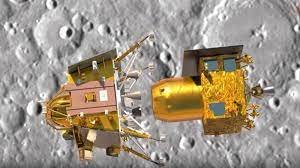The Indian lunar mission, Chandrayaan-3, is set to make a significant attempt to land on the Moon’s surface today around 6 PM. All eyes are on this landing, as if successful, India will become the fourth nation after the United States, Russia, and China to achieve a successful lunar landing.
The Indian media has reported that Chandrayaan-3 is expected to touch down on the southern region of the Moon. The mission, which was launched on July 14 from the state of Andhra Pradesh, has been on a lengthy journey of about 40 days, striving to reach its destination.
The Chandrayaan-3 mission follows in the footsteps of its predecessors, Chandrayaan-1 and Chandrayaan-2, both of which aimed to explore the Moon’s surface and gather valuable data. While Chandrayaan-1 primarily focused on remote sensing, Chandrayaan-2 was an ambitious attempt at a soft landing on the lunar surface. Though the latter’s lander, Vikram, lost communication during the landing attempt, the orbiter component continues to provide valuable information about the Moon’s environment.
Chandrayaan-3 is expected to be a lander-rover combination, designed to explore the Moon’s surface in greater detail. The mission holds significance not only for India but also for the global scientific community. Lunar exploration has consistently expanded our understanding of the Moon’s composition, geological history, and potential resources. If successful, Chandrayaan-3 could contribute significantly to these advancements.
The international space community is closely watching this mission, as it represents India’s continued efforts to establish itself as a formidable player in space exploration. Success in this endeavor would elevate India’s space agency, ISRO (Indian Space Research Organisation), to new heights and further solidify its reputation as a reliable and innovative space agency.
As the world anticipates the outcome of Chandrayaan-3’s landing attempt, the significance of space exploration as a collaborative endeavor becomes evident. Achievements like these underscore the importance of international cooperation in advancing our knowledge of the universe and expanding human capabilities beyond Earth



